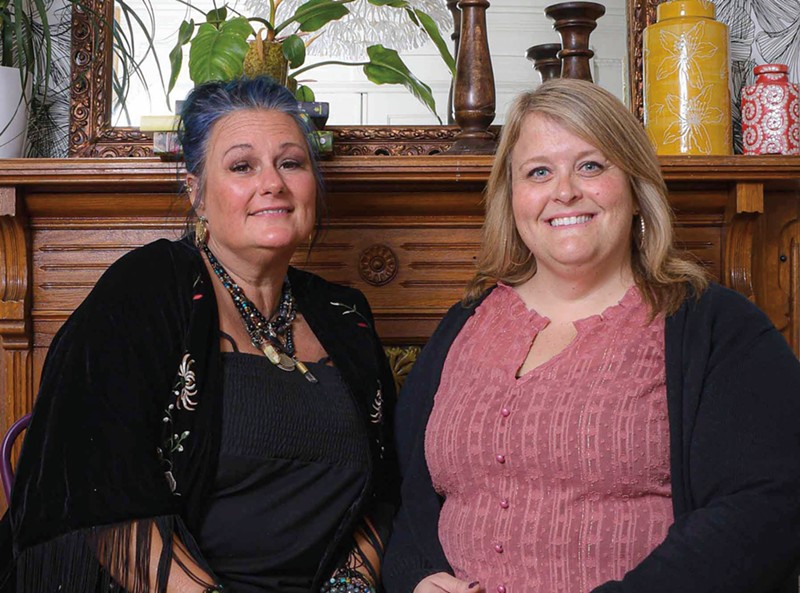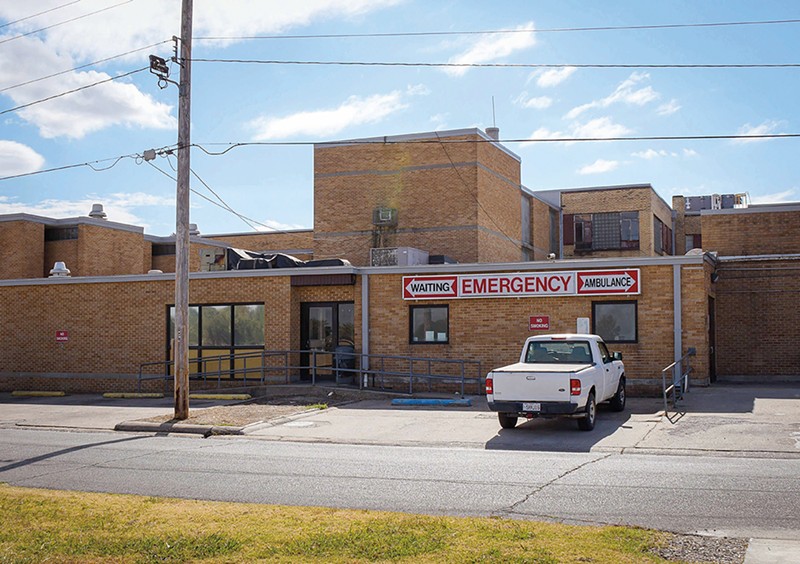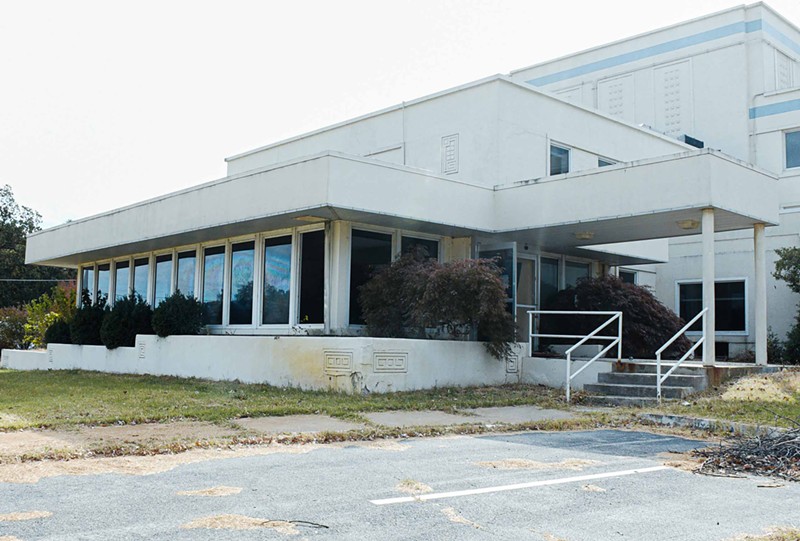This reporting was supported by the International Women’s Media Foundation’s Reproductive Rights Reporting Fund.
Christy Mershon has heard her fair share of horror stories. As the proprietor of a haunted house in Cape Girardeau, she's heard, and lived, literal spine-tinglers of doors slamming and unseen children laughing.
But it's the real-life situations that scare Mershon the most — particularly through her work advocating for better access to reproductive health care and education in southeast Missouri.
As former chair of Bootheel Babies and Families, an infant-mortality reduction initiative in the area, who has also worked closely with Missouri Foundation for Health, Mershon has witnessed it all.
She's known young men to use plastic bags as condoms and later seek care when the bags' seals cut their genitals. She's been bulldozed by public school administrators for trying to implement anything other than abstinence-based sex education. She's encountered women who've used meth to terminate their pregnancies — the closest abortion clinic for most people in southeast Missouri is an hour away in Carbondale, Illinois.
On the surface, southeast Missouri is no different from any other predominantly rural area. People faithfully support high school football teams and go to Friday night games. Walmarts in medium-sized towns serve as the designated shopping spots. Most residents attend Sunday church services and align themselves with conservative or Republican politics.
Yet compared to other rural areas, southeast Missouri is almost always on the low end of statistical hierarchies. People here die younger. Fewer students graduate high school. Babies have the same chance of surviving their first years of life as those in third-world countries.
The area's hospitals are few and far between. With general health care so hard to access for most, reproductive health care is the last thing on people's minds. But that is where the region's health disparities are the steepest.
Near Caruthersville in New Madrid County, cotton bolls dot miles of fields like thousands of tiny snowballs.
It's late September in the Bootheel — the middle of harvest season. Fertile land in the region nurtures crops from cotton to soybeans. At one point, Sikeston, in Scott County, housed more millionaires per capita than any other town its size. Now, the farther south you travel, abandoned structures rot on the side of the interstate. Stores advertised at exits aren't much more than Dollar Generals and gas stations.
In the Bootheel, a corrugated group of counties in the southernmost corner of Missouri, cotton production is at its most concentrated in the state. The plant, colloquially referred to as "white gold," brings southeast Missouri upwards of $250 million every year. According to local lore, teenagers slashed a few farmers' cotton bales one year and cost them thousands of dollars.
Yet, despite what wealth a lucky few in southeast Missouri reap from agriculture, the area is one of the poorest regions of the state. All of the area's counties have poverty rates far higher than the state average, according to the U.S. Census Bureau.
"Whether you're a millionaire farmer or a poor person of color, your service is going to be roughly the same," Mershon says. "Almost everyone lives dozens of miles away from the nearest hospital."
Five of the 10 counties in southeast Missouri have no hospital, according to the Missouri Department of Health and Senior Services. A major hospital popular with residents closed four years ago. Twin Rivers Regional Medical Center in Kennett, Missouri, was shuttered after a failed corporate buyout.
The last major health-care provider before crossing state lines is Pemiscot Memorial Hospital in Hayti, though some residents avoid going there if they can. The hospital has no specialists or obstetric care. Its exterior is ragged.
Rumors that the small hospital would close have come and gone in recent years, but it surprisingly beat out its fiercest competitor when Twin Rivers in Kennett shuttered.
Kim Hughes, director of nursing for the Dunklin County Health Department, says Twin Rivers' closure blindsided Kennett's community.
"It was a shock," Hughes says. "We thought no one would close this hospital."
Twin Rivers was one of the area's largest employers. For a medical center of its medium size, it offered expansive care for patients. It housed the Bootheel's only full-time OB/GYN and offered inpatient, emergency room and outpatient services. Generations of mothers went there to have their babies.
In the year leading up to the hospital's closure, there were rumors that the hospital would close, Hughes says.
According to reports at the time, Community Health Systems, which owned the hospital, had lost over $2 billion after it acquisitioned a for-profit hospital chain bleeding from debt and legal woes.
"You hear things like that, but you think, 'It's never going to happen to us,'" Hughes says. "Well, it did, and it's devastating."
The empty hospital remains along Kennett's First Street. Plans for its crumbling shell have bloomed and died since then. Every year or so, residents hear of a new developer who either wants to revive the hospital or tear it down. Nothing ever happens.
Most Kennett patients now cross state lines to Arkansas or Tennessee to receive care. An urgent-care center opened across the street from the former hospital after it closed, which has been helpful, but it doesn't replace a hospital, Hughes says.
Julie Helfer, who worked in Twin Rivers' mother-baby unit alongside Hughes, says doctors outside of Kennett stepped up to care for their pregnant patients after the hospital's abrupt closure. Now, expectant mothers in the area travel to nearby hospitals outside of the state if they can.
"We're in a high-poverty county," Helfer says. "Not all of our moms can afford the transportation to get back and forth."
Among southeast Missouri's 10 counties, Dunklin County is one of the poorest. A little over 20 percent of its residents live in poverty — well above Missouri's average of 12.7 percent. Kennett is Dunklin's county seat and its largest community.
Deb Cook, the head nurse for Kennett School District, fears her students and their families don't receive medical attention as often as they should. Driving to and from a doctor for a crisis would require at least a half-day trip, a feat too expensive for some.
"If you have any complications at all, you always have to drive somewhere," Cook says. "That's a challenge for these families."
There are times Cook waits 40 minutes for ambulances to arrive during school emergencies. They then take students out of town to facilities that their parents sometimes have no way of getting to.
Cook, like many nurses who still live in the area, worked in the Twin Rivers hospital. She wasn't there when it closed but spent several years tending to patients in the hospital's emergency room.
"It was a busy emergency room," she recalls. "It was needed."
Helfer and Hughes wonder where mothers in Kennett go for emergencies now.
"I don't know how many times me and Julie had patients come up to the unit profusely bleeding," Hughes says. "Their babies are not going to make it in an ambulance [if they have to] call 911 and drive all the way to a hospital."
Between 2002 and 2012, more than 6,200 Missouri babies died before their first birthdays. One-third of those deaths occurred in just two areas, the Bootheel and St. Louis, according to the Missouri Foundation for Health. Five of the seven Missouri counties with the highest infant mortality rates are located in southeast and south central Missouri.
A large portion of rural counties in the U.S. do not have obstetric units, facilities specifically for babies to be born. Four obstetric units serve all of southeast Missouri's 10 counties — an area where about 300,000 people live. In St. Louis, people have at least 17 options.
For most in the Bootheel, whatever options are available are too far away.
Pregnant people who go into labor in Hayti, for example, have three options for obstetrics units. They can drive 40 minutes to Piggot, Arkansas, or 50 minutes to Missouri Delta Medical Center in Sikeston.
The quickest option is to drive 30 minutes to Dyersburg, Tennessee, where a medium-sized community hospital has the closest obstetric department for most Bootheel parents. But some patients resist crossing state lines; Missouri's Medicaid program can't be counted on to cover costs for out-of-state care.
If someone goes into preterm labor or has a high-risk pregnancy, the closest neonatal unit is in Cape Girardeau — at least an hour drive for most. More than likely, a person giving birth will end up in an emergency room with no access to obstetric care.
"There really is a health-care drought in the southern part of our region," says Kendra Eads, executive director of Southeast Missouri Network Against Sexual Violence.
Low-income patients with reproductive health needs will most likely end up at publicly funded county health centers. Up until a few years ago, many of these health centers didn't provide patients with condoms or other contraceptives. If they did, their offerings were in limited supply, according to multiple nurses who spoke with the RFT.
To boost access, the Missouri Family Health Council in 2019 started offering low-or-no-cost contraceptives to health centers through the Right Time Initiative, which serves poor or uninsured patients.
They wanted to help solve health disparities, says Michelle Trupiano, executive director of the Missouri Family Health Council. More than half of all pregnancies in Missouri are unintended. Missourians of color, low-income individuals and people who live in rural areas face disproportionately high rates of unintended pregnancy, according to Trupiano.
Most health departments in southeast Missouri offer family planning services, but the need is still greater than what's available, Trupiano says.
"There needs to be a culture shift to where folks are more open about talking about family planning services and the need for them," Trupiano says. "Especially in rural areas — some folks are uncomfortable about going to any health center for family planning services because they know people there, and they don't want people to know they're accessing them."

There's hardly a community organization in southeast Missouri that Mershon doesn't have ties to. She lives in Cape Girardeau, where she serves on more boards than she can count.
Mershon's main role is leading Southeast Missouri State University's Economic and Business Engagement Center as interim executive director.
But what's most dear to her is settling the region's health-care disparities.
In 2013, the Missouri Foundation for Health sought to reduce the outrageously high infant mortality rates in portions of St. Louis and six counties in Missouri's Bootheel region. This effort birthed FLOURISH in St. Louis and Bootheel Babies and Families in southeast Missouri.
At the time, leaders at the Missouri Foundation for Health were open to any idea that could have an impact on infant mortality rates. Mershon proposed a teen pregnancy and STD prevention program and brought it to schools in the area.
She bought robot babies designed to look like a variety of races. Some school districts in southeast Missouri are fairly diverse. The Bootheel has the largest rural Black population in the state, according to the Missouri Foundation for Health. Black residents make up nearly a quarter of Pemiscot and Mississippi counties.
So Mershon bought white dolls, Black dolls, dolls that were Black and Asian mixed.
But when she brought the dolls to schools, some administrators didn't play ball.
One principal told her the robotic infants look "very lifelike when they cry," Mershon says. And they didn't want their white students "riding around with a Black baby in the back seat because people would talk."
"What the actual fuck," Mershon recalls thinking. But in situations such as these, she says she often can't take people to task for what they say — she still has to work with them.
"Putting yourself into the social mores of these communities. Some might be 65 percent African American, but the majority of the money in those communities, the taxpayer base, is coming from wealthy white farmers who still have Confederate flags flying above their barns," Mershon says.
Sex education is "an afterthought" at most of these schools, Mershon adds.
Missouri schools are not required by law to teach sex education. If schools do opt for some form of sex ed, abstinence is a required topic of instruction, and educators are bound by law to weave in conversation about STD and HIV prevention.
Cook, a registered nurse, has worked in her hometown at the Kennett Public School District for 30 years.
With a population of about 10,000, Kennett is the largest city in the Bootheel region after Sikeston and a relatively wealthy city compared to its neighbors. The majority of its residents are white.
When asked what reproductive health services Kennett School District provides to its students, Cook told a reporter that the district works with middle and high school students when they're pregnant, helping them rearrange their class schedules and connecting them with resources.
Cook and the five nurses who service Kennett School District have a good relationship with the county health department, she says. That's where they send students if they have any STD concerns.
When it comes to contraception, Cook's school district and most others in the area provide no options directly to students, including condoms. Sex education is given an abstinence-only framework. When the district provides HIV education, educators speak to students about condoms, but they never provide them, Cook says.
She says doing so would require the school district to amend its policies. Even though she's the district's lead nurse, she says she's never in her 30 years of employment asked the school board to allow condoms.
"I worried about it being controversial," Cook says. "I never felt like the need rose to the level of the controversy."
She says she feared that proposing to provide students with condoms would create a controversy within the community, similar to how "wearing a mask created controversy within our community."
"You have to decide where you want your battles, and what your high needs are," Cook says. "We've never had students come in looking for condoms."
Sex education is lacking in all corners of Missouri, not only in rural areas, according to Trupiano.
"What we've seen in the past two years — banned books and outrage over how we talk about race in schools — sexual health is no different," Trupiano says. "Schools are fearful of backlash for political reasons, and at the end of the day, our kids are the ones who are losing out."
Alongside the southernmost miles of I-55 in Missouri, billboards plead with women not to abort their babies. Most show babies with wide, toothless smiles. At THIS AMOUNT OF WEEKS, I had THIS BODY PART, they read. One sign quotes former President Ronald Reagan: "I've noticed that everyone who is for abortion has already been born."
It's an odd plea for a region where accessing abortion is nearly impossible.
In June, when the U.S. Supreme Court overturned Roe v. Wade, pro-choice Missourians mourned the loss of the right to abortion in their state. At that point, the state had only one abortion clinic operating in St. Louis. Access to abortion has been nearly nonexistent for most Missourians for the past few years and even longer in southeast Missouri.
Up until mid-October, the closest abortion clinic for most southeast Missourians was over two to three hours away in Granite City, Illinois. Then, on October 11, a new abortion clinic opened in Carbondale, Illinois, in a former dermatologist's office. The clinic, CHOICES Center for Reproductive Health, is still an hour away from the closest southeast Missouri town.
That may be the way most want it to stay. Residents in southeast Missouri have consistently elected Republican politicians to represent them. In 2016, voters in Missouri's 8th Congressional District supported Donald Trump with a whopping 75.4 percent majority vote, making the area one of the staunchest Republican districts in the U.S.
Those in the political minority are few and far between. When the U.S. Supreme Court's draft opinion to overturn landmark abortion cases was leaked in early June, Kenny Eston and a small group of pro-choice advocates gathered in downtown Cape Girardeau to voice their support for abortion rights.
Eston frequently organizes protests, she says. She thinks it's important for the area's sometimes-silent political minority to make their opinions loud and clear, but doing so doesn't come without repercussions.
"We get cussed at, people throw stuff at us," Eston says. "One time, a guy drove by us, yelled some expletives, went home, came back and threw some cat poop at us."
The region's ethos is reflected in its health-care providers.
Saint Francis Healthcare System and SoutheastHEALTH are the two largest health care providers in the region. Both located in the same city, SoutheastHEALTH and Saint Francis have created a thriving medical hub in Cape Girardeau.
It's unclear what the two hospitals' policies are on abortion — they won't talk about it.
When an RFT reporter called a spokesperson for SoutheastHEALTH for a story focused on reproductive care, the spokesperson immediately said they had no comment on abortion and would not participate in the story.
Later, in an email, the same spokesperson denied a request to interview the facilitators of a program for needy pregnant mothers run by Southeast Hospital.
Same goes with Saint Francis, a Catholic health-care system founded by nuns in 1875.
Other smaller health-care providers in the area would not talk about abortion either. Some worried about losing financial support from the two large health care systems. Others fear they'd turn away donors.
"It's an incredibly conservative area," Eads says. "We provide Plan B because, as far as my knowledge, the ERs won't."
Eads' agency, the SEMO Network Against Sexual Violence, was the first advocacy group for sexual assault survivors in southeast Missouri when it was founded 25 years ago. She says NASV maintains a neutral position on abortion.
The agency mainly serves as a child advocacy center for abused children in nine southeast Missouri counties. Its nurses meet rape victims and collect evidence kits at local hospitals or at the agency's offices. Only one sexual assault nurse examiners works throughout the entire region — a side effect of the pandemic and a nationwide nursing shortage, according to Tracy Smith.
Smith, a sexual assault nurse examiner with the agency, says her organization has yet to run into a young survivor whose sexual assault resulted in a pregnancy since the fall of Roe.
But regardless of her personal opinions on abortion, she can't believe Missouri provides no exceptions for rape or incest victims.
Young sexual assault victims are arguably the greatest casualties of southeast Missouri's general lack of health care access.
According to Missouri Department of Health and Senior Services statistics focused on the area, 70 teenagers under 18 got pregnant in 2019. Only three received abortions.
In addition, "all the time, we see 10 year olds, 11 year olds, 12 year olds, who could potentially end up with a very unwanted pregnancy," Smith says. "They have zero recourse if that happens."
But women in the Bootheel face huge disparities no matter their ages. Their schools aren't teaching them about safe sex or consent. They often don't have the means to drive themselves to an abortion clinic, and there are few services for reproductive care in the region.
In a conservative-dominant area, sexual shame can push off healthy conversations around sex — and shut down the possibility of change.
It's a years-old, politics-driven cycle that's made southeast Missouri and so many other rural areas lag behind, Mershon says.
"We are oh-so-religious and [have] our good family values, so we don't provide education," she says. "But then when people have lots of babies because we don't provide education and access, we shame or blame."









